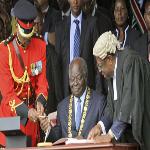27 August 2010

Photo: AP
Kenyan President Mwai Kibaki, centre, prepares to sign the new constitution into law, 27 Aug 2010.
Despite gray skies and light rain, an estimated 10,000 packed into Nairobi's Uhuru Park to take part in the much anticipated Promulgation Day festivities.
The parade ground was filled with excitement as onlookers cheered visiting dignitaries and Kenyan leaders entering the venue. Recently re-elected Rwandan President Paul Kagame received a particularly warm reception from the Kenyan crowd as he took his seat. The event was attended by a handful of other African leaders, including the controversial Sudanese President Omar al-Bashir. Mr. Bashir, recently indicted by the International Criminal Court for crimes against humanity and genocide, was met with silence by the otherwise boisterous crowd.
The event was as much a formal procedure as a celebration of Kenyan society, replete with a full display of the country's military might, traditional dancers from Kenya's various ethnic groups and an appearance by many of the country's champion runners.
The historic ceremony took place just three weeks after Kenya approved the new constitution through an August 4th referendum. The day was billed as a celebration of national unity and diversity, with much symbolism reinforcing that message, but there were signs of lingering resentment from contentious debate regarding the constitution.
Former President Daniel Moi, one of the most vocal opponents of the new constitution, received audible jeers from the crowd upon entering the park. Catholic Cardinal John Njue, who strongly opposed the document over its clauses on abortion, was heckled by many onlookers as he delivered a prayer to open the ceremony.
The event was otherwise peaceful and representative of a collective pride in finally establishing a new set of laws for the nation. With the thousands in attendance looking on President Mwai Kibaki signed the Instruments of Promulgation and declared Kenya's new constitution.
Mr. Kibaki: "I, Mwai Kibaki, President and Commander in Chief of the Armed Forces of the Republic of Kenya, declare that the constitution set out in the schedule shall be the new constitution of Kenya, in effect from the 27th August, the year 2010."
President Mwai Kibaki has been one of the new constitution's most visible proponents since the beginning of the reform process. Many believe that Friday's ceremony will be the crowning achievement of the two-term president's legacy, as he prepares to leave office in 2012.
After President Kibaki signed the document, he and other members of Kenya's executive and judiciary swore oaths under the new constitution.
Perhaps the loudest cheers of the morning came as Prime Minister Raila Odinga took his oath of allegiance. The popular leader, expected by many to become the next president, worked the crowd into a frenzy as he swore his allegiance to the country.
Odinga: "I, Raila Omolo Odinga, in full realization of the high calling as the prime minister of the Republic of Kenya do swear that I will be faithful and bear true allegiance to Republic of Kenya, that I will obey, preserve, protect and defend this constitution of Kenya as by law established and all other laws of the republic, and that I will protect and uphold the sovereignty, integrity and dignity of the people of Kenya, so help me God."
The new constitution's entrance into force marks what many have called the birth of the second Kenyan Republic. The former constitution, in place since independence from Britain 1963, was seen by many as a relic of the colonial era. Kenya has been trying to replace the document since the early 1990s, but deep political and ethnic divisions within Kenyan society blocked all previous attempts.
In many ways the foundation for this new era was laid in 2008 during post-election chaos that left over 1,000 dead. After President Kibaki and Prime Minister Odinga disputed the results of the December 2007 presidential elections, nearly two months of ethnic violence swept across the country.
The peace agreement forged between the two leaders formed a Government of National Unity and set in motion the process of constitutional reform. The cooperation of the two principles along with the widespread support of the process has inspired international confidence in Kenya's democracy.
Kenya will now begin the process of transition to the new constitution. While many provisions in the document take immediate effect, changes to the country's governing structure will be phased in gradually, and the new set of laws is not expected to be fully operational until after the presidential elections in 2012.